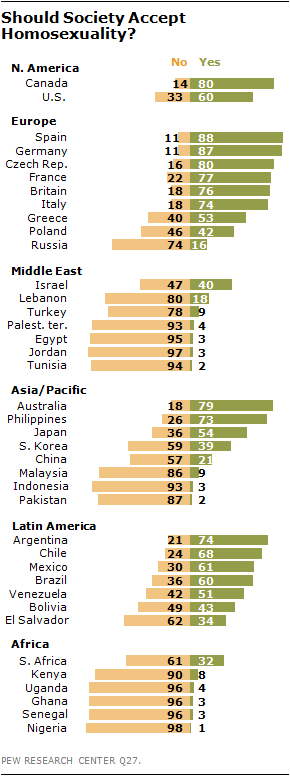A survey of people's attitudes towards homosexuality has shed some interesting (if predictable) light on the Middle East. The 39-country poll by the Pew Research Center found the Middle East and sub-Saharan African had lowest levels of acceptance worldwide.
In all the Middle Eastern countries surveyed – Israel, Lebanon, Turkey, Egypt, Jordan, Tunisia and the Palestinian territories – majorities answered "No" to the question: "Should society accept homosexuality?"
In Egypt, Jordan, Tunisia and the Palestinian territories the majorities saying "No" were extremely large – well over 90%.
Moreover, there is little or no evidence that attitudes in the region are shifting towards acceptance – and in some countries they seem to be moving in the opposite direction. In comparison with a similar survey in 2007, acceptance levels have fallen in Turkey from 14% to 9%, in Jordan from 6% to 3% and in the Palestinian territories from 9% to 4%.
Israel and Egypt have shown tiny increases which are not significant statistically – from 38% to 40% and from 1% to 3%, respectively.

Worldwide, the biggest shifts in acceptance levels over the last six years were found in South Korea (up from 18% to 39%), the US where there is now a majority in favour (up from 49% to 60%) and Canada (from 70% to 80%).
Although Israel's 40% acceptance level is the highest in the Middle East – and it's the only country in the region that officially recognises LGBT rights – the survey highlights a considerable gap between the legal position and attitudes among the Israeli public.
Ynet news notes: "This [40%] figure is lower than in any other western, developed country that was surveyed, with the exception of South Africa."
Worldwide, women are more likely to accept homosexuality than men and, generally speaking, younger people are more likely to accept it than older people. In Israel, the gender gap between male and female acceptance was 17 percentage points – the largest in the survey. On the other hand, age does not make much difference as to whether Israelis accept it or not.
Religious attitudes, however, are clearly a major factor. A majority of secular Jews in Israel (61%) said homosexuality should be accepted, compared with on 26% of those who described themselves as traditional, religious or ultra-Orthodox. Among Israeli Muslims, meanwhile, those favouring acceptance were only 2%.
According to the Pew Research Center, there is "a strong relationship between a country’s religiosity and opinions about homosexuality", with far less acceptance of homosexuality in countries where religion is central to people’s lives.
(The survey measured levels of "religiosity" by asking respondents whether they considered religion to be very important, whether they thought it necessary to believe in God in order to be moral, and whether they prayed at least once a day.)
The link between religiosity and disapproval of homosexuality does not apply everywhere, though. Pew points out that two countries which score highly on religiosity – Brazil and the Philippines – also have large majorities that accept homosexuality. Conversely, Russia and China which have low religiosity scores coupled with low levels of acceptance for homosexuality.
Lebanon's acceptance level is easily the highest among the Arab countries surveyed, though still low at 18%.
Lebanon also has a history of gay activism stretching back about 10 years and local media tend to be more open about discussing sexuality. Despite that, the survey found no change in the overall level of acceptance since 2007.
Differences among age groups are a possible indication that this could change in future, however. In the 18-29 age bracket, 27% of Lebanese think homosexuality should be accepted, compared with 17% of those aged 30-49 and 10% of those aged 50-plus.
Unfortunately, there are no comparable figures for Lebanon in 2007 broken down by age so, as Executive Magazine notes, "it is impossible to know whether this is a new trend among young people or not".
The magazine adds: "If it's an old one, that bodes poorly for gay rights: either young people are growing more conservative as they age, or they are leaving Lebanon altogether." If Lebanon follows the global pattern among young people, though, it probably does point to increasing acceptance.
Details of the survey's methodology are here.
Posted by Brian Whitaker
Friday, 14 June 2013

 RSS Feed
RSS Feed
